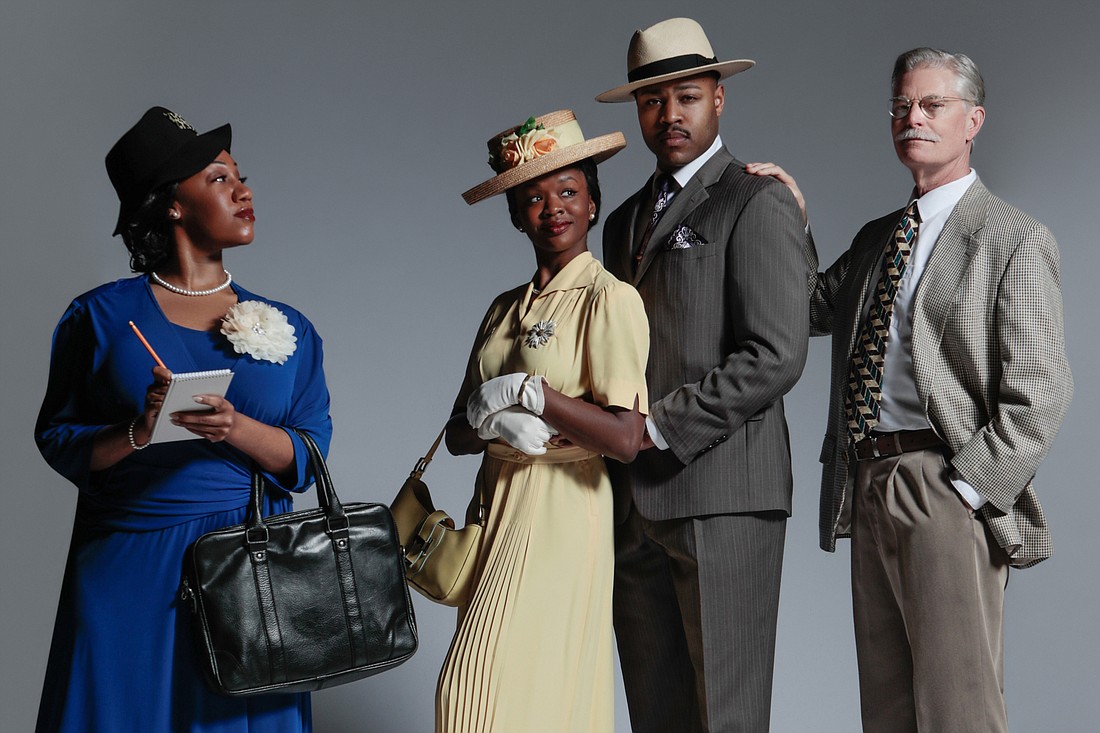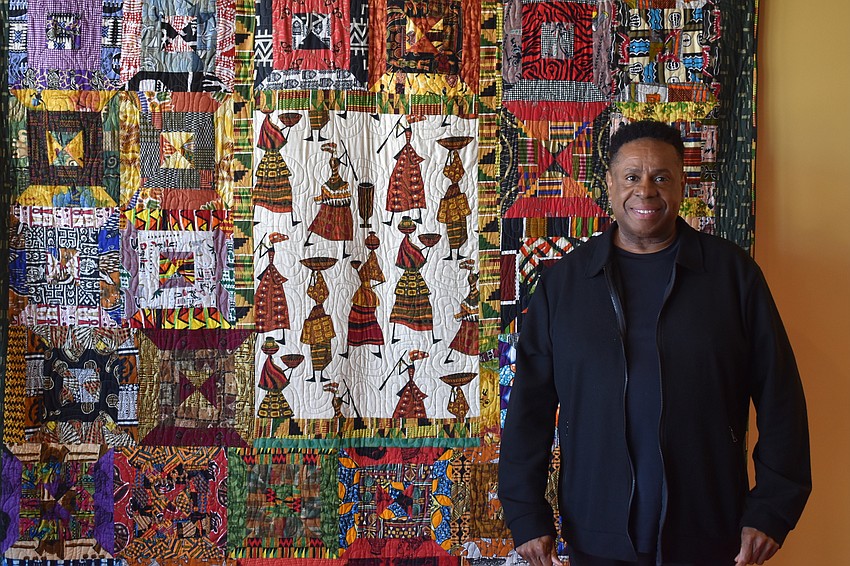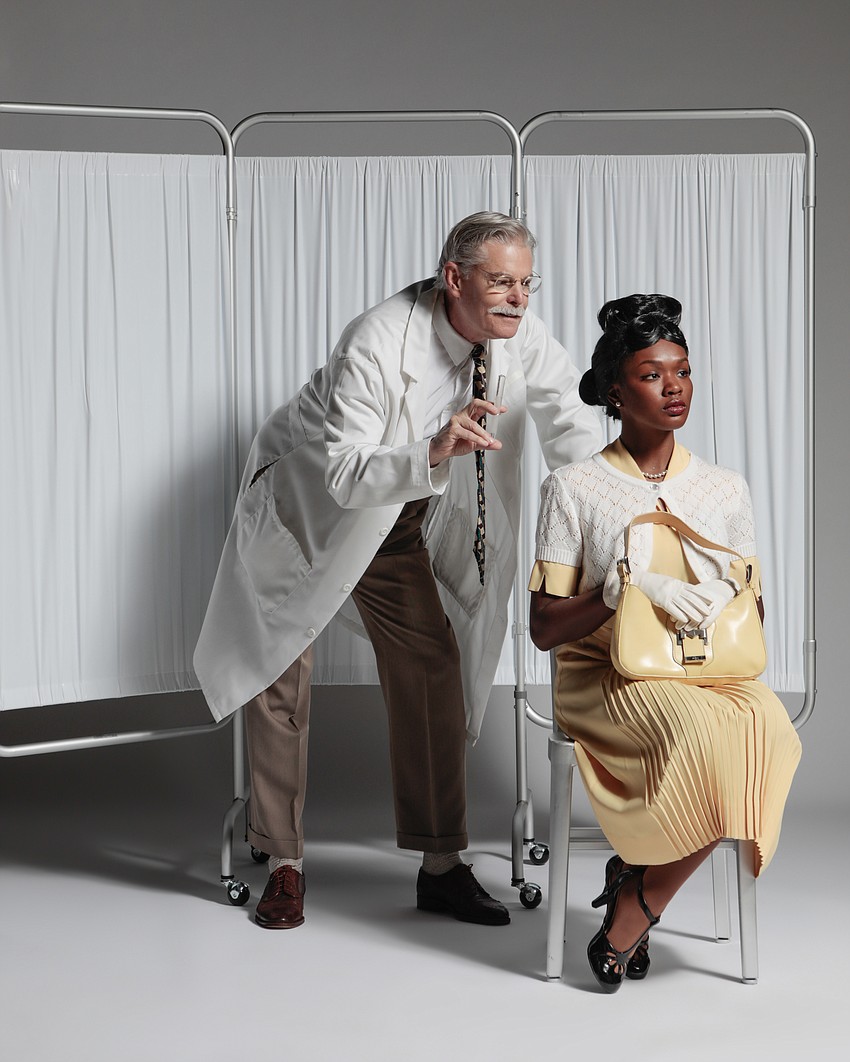- April 29, 2024
-
-
Loading

Loading

In the 25 years since he founded Westcoast Black Theatre Troupe in Sarasota, Nate Jacobs has won numerous awards and national recognition for producing Black-themed plays and musicals and for creating original musical revues. Now, Jacobs has achieved a new milestone with WBTT's latest production, "Ruby."
The musical, about a prosperous Black woman in 1950s Florida who killed a white physician, is a fully realized musical, not a revue like many of WBTT's popular shows. "It can travel anywhere in the legit theater world after it closes in Sarasota," Jacobs says.
In show biz speak, "legit" doesn't mean legal or kosher. It means a professionally produced stage play with a script and, in the case of a musical, songs with lyrics. It's a big deal.
"Ruby" director Jacobs credits WBTT's evolutionary leap to his brother, Michael Jacobs, with whom he wrote the book for "Ruby" and who wrote the lyrics, and to composer Nehemiah Luckett.
On "Ruby," Luckett gets credit for "additional music." But his contribution is immense, Jacobs says, because of his experience with orchestral arrangements.
The music for "Ruby" was written by Nate Jacobs, Brennan Stylez and Antonio Wimberly.
The idea for the show came from one of WBTT's patrons, who kept emailing Nate Jacobs and former WBTT CEO Christine Jennings. Her idea? A play about a 1950s murder case covered by famed Black author Zora Neale Hurston. Jacobs couldn't immediately recall the patron who brought the idea for "Ruby" to his attention, but says he's grateful for her persistence.

It took some prodding, but when Jacobs finally delved into the details of Ruby McCollum's murder of Dr. C. Leroy Adams on Aug. 3, 1953, in Live Oak, Florida, he was hooked.
After watching a documentary on the case, Jacobs enlisted the help of his brother, a semi-retired lawyer. "Of course, I decided to write a musical," Jacobs laughs.
The "of course" is because Jacobs loves music and has created and adapted many successful revues for WBTT, including the holiday spectacle "Joyful! Joyful!," "Marvin Gaye: Prince of Soul" and "Cotton Club Cabaret."
Jacobs saw no reason why murder couldn't be the subject of a musical. "The story of Ruby McCollum and her husband Sam is the stuff of Greek tragedy," he says. "It's a rise and fall."
The rise was when the McCollums moved to Live Oak, buying a mansion and living with the trappings of wealth unusual for a Black family in that time and place. Their lifestyle inspired admiration among Live Oak's Black residents but also provoked envy among whites, to hear Jacobs tell the story.
The fall came after Ruby McCollum walked into her doctor's office and shot him to death in broad daylight. In the wake of the shooting, it came to light that the McCollums were involved in illegal liquor sales and gambling.
According to Jacobs, there was plenty of schadenfreude in Live Oak after Ruby's arrest and the revelation of the family's shady sources of income. "The whites were happy to see Ruby and her husband go down," Jacobs says.
Meanwhile, the town's Black residents were devastated at the downfall of their heroes. "I remember talking to an actual person who lived in Live Oak at the time," Jacobs says. "She told me, 'We were heartbroken because they were our hope. I was inspired that somebody who looks like me could actually live life on that scale.'"
Compounding the tragedy of the McCollum family was the untimely death of Sam McCollum. After his wife was arrested, he took their children and fled Live Oak to get out of harm's way. But he soon succumbed to a heart attack, Jacobs says.

Ruby was the bookkeeper of the McCollums' business operations and, according to Jacobs, kept a record book that mysteriously disappeared. Presumably it listed the names of white, well-heeled customers.
When the Ku Klux Klan came for Ruby at the local jail, she wasn't there, Jacobs says. She later ended up in a state insane asylum in Chattahoochee and was eventually released. "The mystery is: How did a black woman do a crime of this sort and live to tell about it?" asks Jacobs.
To this day, there are still a lot of unknowns. Did Ruby's husband know she was involved in a sexual relationship with Adams, who was the father of one of her children? Was the relationship consensual?
Jacobs says it's likely Ruby was pressured into having sex with her doctor. "Back then in the South white powerful men did what they wanted," he says. "It was almost like an extension of slavery. But something in the mix stirred Ruby to become so angry that she felt like the only way out of whatever she was caught in was to kill this man."
When writing the book for the musical "Ruby" with his brother, Jacobs says he drew on his own experience of how he was looked down upon by some people in Sarasota after he decided to form WBTT. "Some people thought I was rising above my station," he says, when he decided to found a theater and direct after a career as an actor and teacher in Sarasota.
At one point in the early days of WBTT, Jacobs says he was so discouraged that he considered throwing in the towel and moving away. When he met playwright August Wilson in the early 2000s at the Black Theatre Festival in Winston-Salem, North Carolina, Jacobs says he told Wilson that he was thinking of leaving Sarasota. Wilson, the late author of 10 plays, including "Fences" and "Ma Rainey's Black Bottom," told him to stay put.
Interviewing Jacobs under a framed 2021 New York Times article about the success of WBTT and reading about Jacobs' many accolades, including the Larry Leon Hamlin Producer Award at the 2015 National Black Theatre Festival in Winston-Salem, it's hard to imagine those dark days. Today, audiences flock to WBTT's campus, which officially opened in 2020, giving it a permanent home after years in temporary, rented spaces.
With Black residents making up less than 5% of Sarasota County's population, Jacobs has chosen a seemingly unlikely location for a theater with people of color performing shows about Black lives. Jacobs sees a parallel between WBTT audiences and the rich, sophisticated white patrons of Harlem's famed Cotton Club in the 1920s.
Despite the support of Sarasota's theatergoers, donors and influential champions such as Howard Millman, the retired producing artistic director of Asolo Repertory Theatre who serves on WBTT's board of trustees, WBTT was knocked flat by Covid just like all other theater companies.
The pandemic and its aftermath caused "Ruby" to be postponed, not just once, but two times. In the process, one story line was cut from the musical. "We originally had two stories," Jacobs says. The first was a fictional tale of a white sheriff's wife who was ready for change and the second was the mainly factual story of Hurston, who was already well known at the time but had not achieved the peak of her fame.
In the final version of "Ruby," Hurston is the narrator. She also sings. As fate would have it, the articles Hurston wrote for the Pittsburgh Courier were in an archives of Black newspapers that Jacobs had in his possession. As a result, he and his brother were able to work with original source material.
Even though new songs were written, the running time for "Ruby" was cut from three to two hours, making it easier on audiences and improving the chances that "Ruby" will be produced elsewhere.
The cast is also different. It now includes Catara Brae (Ruby McCollum), Maurice Alpharicio (Sam McCollum), Larry Alexander (Dr. C. Leroy Adams) and Ashley Elizabeth Crowe (Zora Neale Hurston).
For his part, Jacobs is pleased with the new "Ruby." "The third time is definitely the charm," he exults. Or, as Shakespeare once wrote, "All's well that ends well."